Livagen 20mg (Bioregulator)
$65.00
Livagen is a short bioregulatory peptide that has direct effects on DNA structure and function. It is best known for its ability to decondense chromatin, thereby increasing the expression of certain genes and improving the “youthful” profile of cells. Its most studied effects are on lymphocytes of the immune system. Through these cells, Livagen has been shown to activate the immune system and offset disease in the heart, GI tract, immune system, and central nervous system. Livagen research has also shown promise in the area of nociception and pain control. Ongoing research will help to further unravel the promise of Livagen and bring humanity closer to understanding the processes of aging and senescence.
Livagen, a short peptide closely related to Epitalon (aka Epithalon), is known for its effects on the immune system, Gl tract, and liver. As a peptide bioregulator, Livagen has direct effects on DNA and gene expression patterns. Its purported anti-aging properties are thought to result from Livagen’s ability to activate genes in the Gl tract and immune system that are otherwise silenced as a result of DNA condensation with age.
Livagen, Chromatin, and the Immune System
DNA is contained within the nucleus of eukaryotes, like humans, in a hierarchy of ever more condensed organization that takes the roughly 3 feet of DNA that is contained within a human cell and packages it to fit within the space of one hundredth of a millimeter. In other words, the packaging of DNA reduces its overall size by about 100,000 times.
The double helix of DNA is wrapped around proteins, called histones, which themselves conglomerate to form chromatin structure, which further condenses to form chromosomes. This progressive organization of DNA serves several purposes including condensing the genetic material for replication and cell division, condensing the genetic material so that it fits within cells, and controlling expression of genes at a very high level. In other words, DNA organization is all about packaging the genetic material and about controlling access to specific genes[1].
Research in older adults suggests that Livagen activates a number of genes in the lymphocytes of older people by inducing the decondensation (unpacking) of chromatin. This results in the activation of genes that are otherwise silent in older adults including ribosomal genes responsible, indirectly, for robust protein production and enhanced cell activity[2]. This information suggests that Livagen has a direct effect on the DNA within lymphocytes, which are a primary cell of the immune system.
Research looking that the end-points of Livagen, Epitalon, and Vilon administration in elderly individuals shows that Livagen has four different effects in lymphocytes including
- activating synthetic processes by reactivating ribosomal genes,
- npacking chromatin,
- ltering gene expression, and
- inducing decondensation.
All of these effects lead to reactivation of chromatin that is silenced as we age[3]. Though long-term effects have not been studied, there is the belief among researchers that this resets lymphocytes to a more “youthful” state.
Lymphocytes are a class of white blood cell that contains B cells and T cells. B cells produce antibodies against foreign invaders while T cells destroy cells of the body that are either infected with an invading organism or have become cancerous. T cells also produce cytokines, which are chemical signals that coordinate immune responses and control inflammation in the body[4]. In other words, lymphocytes are among the most important cells of the immune system. Their decline in activity with age may be at least part of the explanation for why we become more susceptible to all varieties of disease and illness as we age. The ability to reset these cells to a more youthful state could help to ward off infection and cancer.
Livagen and the Heart
Lymphocytes play an active role in cardiac health, so it was natural for researchers to wonder what effects Livagen might have on the heart. Research in patients with hypertrophic cardiomyopathy (HCM) suggests that dysregulation of chromatin structure in lymphocytes is a pathogenic feature in HCM and atherosclerosis that, if correct, may improve long-term outcomes[5].
Several studies suggest that release of genes via decondensation of chromatin in lymphocytes may help to reduce long-term sequelae from various forms of heart disease[6]. Of course, this is precisely what Livagen does and so there has been a great deal of research in this area [7], [8]. Changes to lymphocyte gene expression may help to reduce inflammation and the scarring that it leads to in individuals with HCM. Livagen may also be useful for preventing the onset of HCM in those who are genetically predisposed to the condition as well as following heart attack or other cardiac injury. Livagen may provide the basis for advanced preventative strategies that will reduce the overall morbidity and mortality associated with heart disease.
Livagen and Pain
Enkephalins are short peptides that the body uses to signal pain. They bind to both mu and delta opioid receptors. Mu receptors, which bind morphine, cause a reduction in pain, blood pressure, and consciousness when activated. Delta receptor activation leads to reduced pain perception and may account for the respiratory depression seen with opiates.
Work on bioregulatory peptides shows that Livagen inhibits the activity of enkephalin-degrading enzymes in the blood, thereby increasing levels of natural pain killers in the body[9]. Naturally, this suggests that Livagen may be an effective treatment for pain. blood pressure, and consciousness when activated. Delta receptor activation leads to reduced pain perception and may account for the respiratory depression seen with opiates.
Work on bioregulatory peptides shows that Livagen inhibits the activity of enkephalin-degrading enzymes in the blood, thereby increasing levels of natural pain killers in the body[9]. Naturally, this suggests that Livagen may be an effective treatment for pain. There is ongoing research to determine how well it controls pain, what the side effects of enhanced enkephalin levels are, and whether there is any addictive potential as there is with opioids like Oxycontin.
Livagen and the Gl Tract
New research suggests that both my and delta receptors, when activated, play an important role in protecting the mucosal barrier of the Gl tract. The net result of Livagen in this setting is an increase vagal nerve signaling to the Gl tract and altered levels of both mucosal nitric oxide and prostaglandins [10]. This leads to profound gastroprotection that may be useful in everything from treating infectious diarrhea to reducing the symptoms and long-term consequences of inflammatory bowel disease. Given its ability to enhanced activation of these receptors by enhancing levels of enkephalin in the bloodstream, it should come as no surprise that Livagen is being considered as a potential treatment for a variety of disorders of the Gl tract.
Livagen and Aging
What should be obvious by now is that many of the effects of aging are a result of changes in the way DNA is organized and thus the types of genes that can be accessed and expressed. These changes have been detailed in research by the leading authority on chromatin changes in aging, Professor Teimuraz Lezhava. His work shows that levels chromosomal aberrations increase with age. These aberrations include progressive condensation of chromatin (think of this as increasing inactivation of DNA) and decreases in repair processes (secondary to the inactivation that arises from condensation) [11]. There is good evidence to suggest that reversing the process of condensation may, in fact, be an effective means of extending lifespan. After all, if silencing genes leads to progressively faster aging, reactivating those genes should slow the process. Dr. Lezhavas’s research shows that Livagen, Epitalon, and a handful of other bioregulatory peptides are already know to impact this process by decondensing DNA[12]. His work shows that there is good reason to believe that these peptides can, in fact, help to thwart some of the dysfunction that arises with age, particularly as it relates to immune dysregulation and decreased protein synthesis.
Livagen Summary
Livagen is a short bioregulatory peptide that has direct effects on DNA structure and function. It is best known for its ability to decondense chromatin, thereby increasing the expression of certain genes and improving the “youthful” profile of cells. Its most studied effects are on lymphocytes of the immune system. Through these cells, Livagen helps to activate the immune system and offset disease in the heart, Gl tract, immune system, and central nervous system. Livagen even shows promise in the area of nociception and pain control. Ongoing research will help to further unravel the promise of Livagen and bring humanity closer to understanding the processes of aging and senescence.
Livagen exhibits minimal side effects, low oral and excellent subcutaneous bioavailability in mice. Per kg dosage in mice does not scale to humans. Livagen for sale at Peptide Sciences is limited to educational and scientific research only, not for human consumption. Only buy Livagen if you are a licensed researcher.
Frequently Asked Questions (FAQs) about Livagen 20mg (Bioregulator)
1. What is Livagen 20mg?
Livagen is a tetrapeptide bioregulator composed of the amino acids Lysine (Lys), Glutamic Acid (Glu), Aspartic Acid (Asp), and Alanine (Ala). It is primarily studied for its potential effects on liver function, the immune system, and gene expression.
2. What are the potential benefits of Livagen?
Research suggests that Livagen may:
-
Enhance liver function and support detoxification processes.
-
Influence gene expression by decondensing chromatin, potentially activating silenced genes.
-
Support immune system activity, particularly in lymphocytes.
-
Possibly exhibit anti-aging effects by promoting cellular rejuvenation.
3. How is Livagen administered?
Livagen is typically administered via subcutaneous injection. The recommended dosage is 20 units per day (2mg), with one pen providing 10 doses or a 10-day supply. It is essential to follow proper injection techniques and consult with a healthcare professional before use.
4. What are the possible side effects of Livagen?
Livagen is generally well-tolerated, with no significant side effects reported in available studies. However, as with any peptide, individual reactions may vary. It’s advisable to use Livagen under medical supervision to monitor for any adverse effects.Peptide
5. Is Livagen suitable for everyone?
Livagen is intended for research purposes only and should not be used without appropriate medical guidance. Individuals with serious health conditions or those who are pregnant or breastfeeding should avoid using Livagen unless advised by a qualified healthcare provider.
6. Where can I purchase Livagen 20mg?
Livagen is available through various research supply companies. It’s important to ensure that any purchase complies with local regulations and is intended for legitimate research purposes.Canlab International
7. How should Livagen be stored?
Livagen should be stored in a cool, dry place, away from direct sunlight. Once reconstituted, it should be used promptly or stored according to the manufacturer’s instructions to maintain stability and efficacy.
8. Can Livagen be combined with other peptides?
Some studies suggest that Livagen may work synergistically with other peptides, such as BPC-157 and TB-500, to enhance liver function and promote overall health. However, combining peptides should only be done under the supervision of a healthcare professional to ensure safety and efficacy.
9. Is there a risk of overdose with Livagen?
Peptide bioregulators like Livagen are designed to activate natural physiological processes. Overdosing is unlikely, as excess peptides are typically broken down and utilized by the body. Nevertheless, adhering to recommended dosages is crucial, and any deviations should be discussed with a healthcare provider.
10. What is the legal status of Livagen?
Livagen is classified as a research chemical and is not approved for human consumption or medical use. It is essential to use Livagen strictly for its intended research purposes and in compliance with all applicable laws and regulations.
Vendor: PeptideNationUSA
5 reviews for Livagen 20mg (Bioregulator)
Add a review Cancel reply
Related products
Bioregulators
Bioregulators
Bioregulators
Bioregulators
Bioregulators
Bioregulators
Bioregulators
Bioregulators

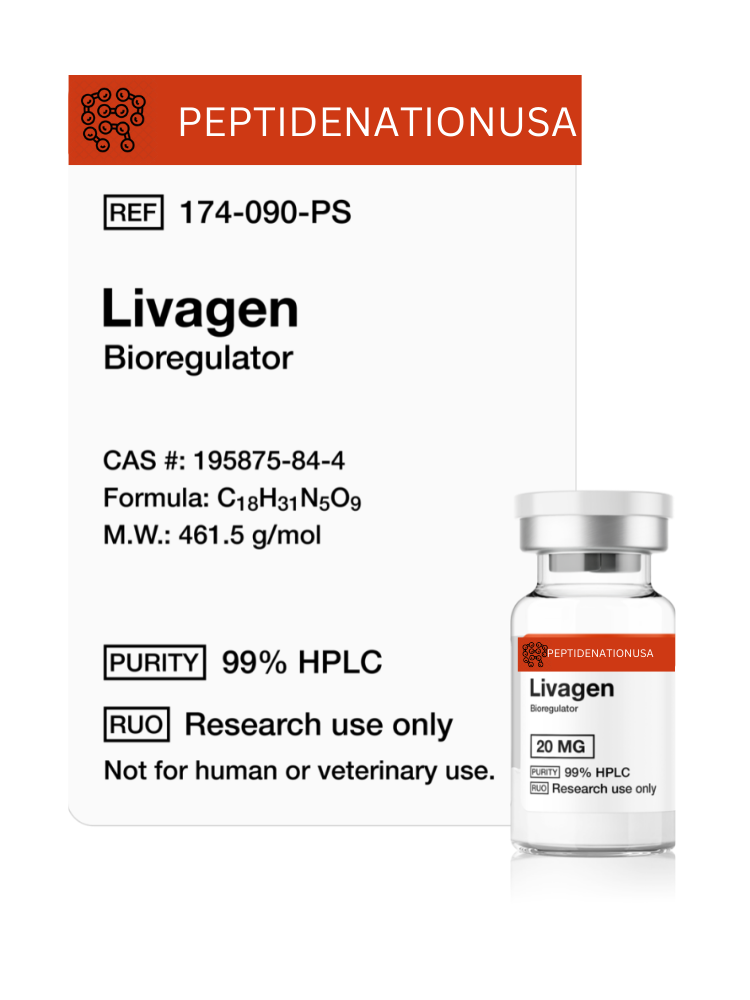
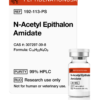
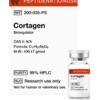



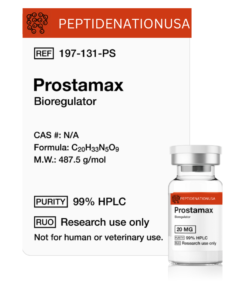


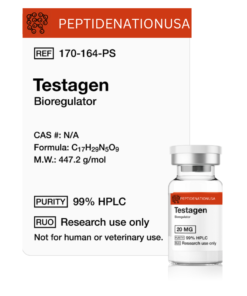
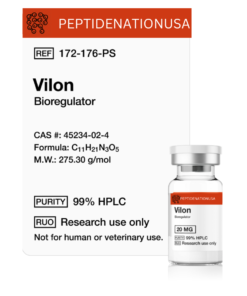
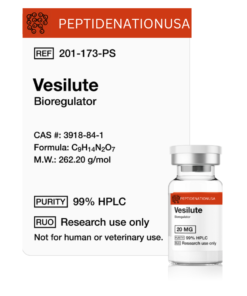
Rebecca Green –
Perfect for what I needed. Thank you!
John Morris –
It worked better than I expected. I feel more balanced and healthier.
Olivia Moore –
Excellent results without any side effects.
Rebecca Morris –
Mild effects at first, but got stronger over time. Very satisfied.
James Green –
Helped with my symptoms almost immediately.